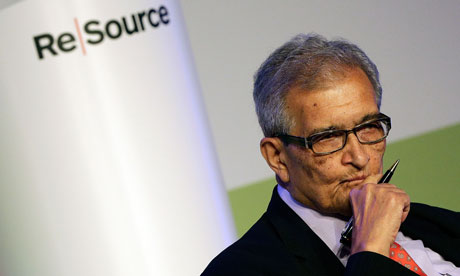 |
| Nobel prize-winning economist Amartya Sen |
The global battle for natural resources – from food and water to energyand precious metals – is only beginning, and will intensify to proportions that could mean enormous upheavals for every country, leading academics and business figures told a conference in Oxford on Thursday.
Sir David King, former chief scientific adviser to the UK government, who convened the two-day Resource 2012 conference, told the Guardian: "We are nowhere near realising the full impact of this yet. We have seen the first indications – rising food prices, pressure on water supplies, a land grab by some countries for mining rights and fertile agricultural land, and rising prices for energy and for key resources [such as] metals. But we need to do far more to deal with these problems before they become even more acute, and we are not doing enough yet."
Countries that are not prepared for this rapid change will soon – perhaps irrevocably – lose out, with serious damage to their economies and way of life, the conference was told.
Amartya Sen, a Nobel prize-winning economist, said that the free market would not necessarily provide the best solution to sharing out the world's resources. Governments would need to step in, he said, to ensure that people had access to the basics of life, and that the interests of businesses and the financial markets did not win out over more fundamental human needs.
Sen has played a key role as an academic in showing how the way resources are distributed can impact famine and surplus more than the actual amount of resources, that are available, particularly food.
David Nabarro, special representative for food security and nutrition at the United Nations Special, defended the outcomes of last month's Rio+20 conference – a global summit that was intended to address resource issues and other environmental problems, including pollution, climate change and the loss of biodiversity, all of which are likely to have knock-on effects that will exacerbate resource shortages. More